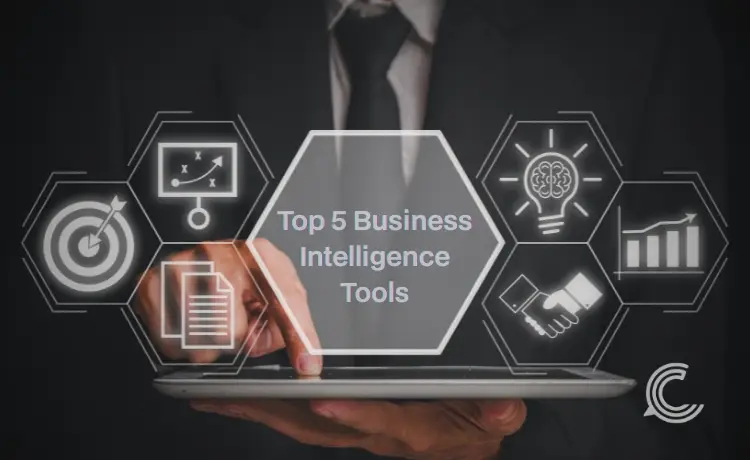Top 5 Business Intelligence Tools to Consider in 2026

The use of business intelligence (BI) tools has become a necessity for companies seeking to stay ahead of the competition in today’s data-driven business environment. Data is no longer simply a resource; it is an asset that can drive business expansion, enhance process efficiency, and facilitate easier decision-making. The top business intelligence tools enable companies to transform their raw data into actionable insights, empowering executives to make informed decisions and maintain their competitive edge in a rapidly evolving market. Choosing the best BI tools to go for is a key decision for organizations that want to make the most out of their data in 2026.
The Evolving Landscape of Business Intelligence in 2026
In 2026, the business intelligence landscape will be influenced by many trends that revolve around how companies use data. The leading AI and machine learning technologies are resulting in predictive analytics being the most powerful side of enterprises in data-driven decision-making, improving on accuracy. Also, self-service BI platforms are becoming popular among users without technical skills, as they enable them to explore and analyze data, leading to agility. Cloud-native solutions further provide scalability and flexibility, as well as easy integration with other business tools.
Top 5 Business Intelligence Tools for 2026
1. Microsoft Power BI
Microsoft Power BI is one of the best business intelligence tools, famous for its seamless integration with the Microsoft ecosystem, including Excel and Azure. This feature makes it a perfect fit for companies that are already using Microsoft products, as it allows good data flow and user experience. Power BI is equipped with a simple interface that allows users to make interactive dashboards and detailed reports. Moreover, its strong data modeling features offer the ability to perform complex data analysis, giving companies vital insights. Besides, Power BI is user-friendly and provides both cloud and on-premises versions. The tool is cost-effective and available at reasonable prices. Organizations of all sizes, from small to large, can benefit from the scalable and efficient BI software.
2. Tableau
Tableau is known by many for its stunning data visualizations and user-friendly drag-and-drop interface, making it one of the best business intelligence software solutions. It is highly valued by companies that are focused on delivering clear and engaging insights. It lets users visually interact with their data, which simplifies the process of discovering intricate patterns, trends, and correlations that may not be immediately obvious in regular spreadsheets.
While the interactive features attract users, Tableau’s wide selection of charts allows businesses to tailor it to their needs. It provides the possibility to build informative, dynamic dashboards that present the data in a user-friendly manner. One of the other major features of Tableau is its ability to maintain good performance even with large datasets, helping users to efficiently work with more data.
3. Qlik Sense
Qlik Sense is a powerful data analytics platform that is driven by a powerful engine, which enables users to interact with data without being restricted by the constraints of traditional hierarchical models. Its key feature is that it allows users to link different data sources to reveal insights. On top of that, Qlik Sense is powered by AI and machine learning algorithms that offer users an array of automated and advanced insights. These capabilities help users to efficiently uncover the patterns and trends present in huge, complex datasets. The ability of the platform to accommodate large datasets without compromising on efficiency is what makes it suitable for companies that have to deal with long streams of data. As a result, Qlik Sense becomes an excellent pick for such companies.
4. Looker (Google Cloud)
Looker, which has been integrated into Google Cloud, is a new-generation data platform that offers a unique way to open the doors to the whole potential of a company by providing integrated data analytics and business intelligence. The main feature in Looker is LookML, a data modeling language, which keeps data definitions under data governance across the organization. LookML lets data teams build with shared data models that represent the common information perspective, reducing confusion and ensuring accuracy. Looker is also integrated with Google Cloud, which extends its potential to the maximum, with memory and CPU resources from the cloud becoming easily accessible, along with the use of other Cloud-based analytics tools. Its interface is designed in such a way that users can explore data while observing data governance principles, which is why it is a top solution for most companies.
5. Domo
Domo is an all-in-one business management platform that is known for its real-time connectivity to hundreds of data sources, which keeps businesses informed on the latest insights across various departments. The simple-to-use dashboards allow users to quickly interact with large data sets, make decisions faster, and have better coordination. The tool’s design is focused on mobile devices; therefore, decision-makers who are always on the move can have access to the most important business data without any inconvenience, making it a tool that is adaptable to modern organizations. A major strength of Domo is that it puts a lot of emphasis on social data sharing, and this feature is effective for collaboration as it allows users not only to share but also to comment on and interact with the data they have at hand.
Also read: Nvidia Looks East: Expands AI and Chip Investments Across Asia
Factors to Consider When Choosing a BI Tool
Before deciding on a business intelligence (BI) tool, companies need to review some important factors to get the right fit for their needs. Different pricing methods, e.g., offering the product under a license or following a subscription-based plan, can affect the product’s price in the long run; thus, choosing a model that suits the organization’s budget is imperative. Another important issue is the scalability that should support the business. The amount of technical knowledge to be used for implementation and continuous service should also be considered, especially for non-technical teams. Moreover, businesses have to determine if the BI tool is capable of integrating with their current data sources, whether on-premises or cloud.
Making Data-Driven Decisions
Investing in the right BI tool is important since the business can unlock the full benefit of data and help in making informed decisions. The best choice will largely depend on the specific requirements of a company, like size, technical skills, and the requirements of data integration. An in-depth study and a meticulous evaluation will make sure any chosen tool is capable of handling present situations and also scale with the growth of the business. The right business intelligence system will enable companies to stay competitive, adapt to change, and make decisions based on data with high accuracy and efficiency.



